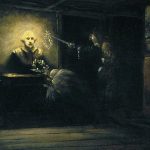
Teaching Shakespeare Magazine: New Editor Wanted
2nd June 2021
A message from Sarah Olive (Editor of Teaching Shakespeare)
After twenty-odd issues of Teaching Shakespeare, I will be stepping down from the role of editor from June 2021 as I take on the role of lead editor for the academic journal Jeunesse: Young people, texts, cultures. It’s been an absolute pleasure and a great honour to be the editor for the past decade, and I can’t thank warmly enough the BSA trustees, our fabulous designer Becky Chilcott, our guest editors and, last but not least, our contributors and readers. The British Shakespeare Association will now be running a process to select the next editor of Teaching Shakespeare. So, to help with that task, I’m sketching out below a little of the magazine’s history and how it currently operates (something the new editor may well work with the BSA to change), so that you can see if you would like to nominate yourself for the role.
Teaching Shakespeare is a freely-available, online magazine for the British Shakespeare Association, published since 2011, at the instigation of then BSA President, Professor Stuart Hampton-Reeves and the BSA Education Committee, then led by Dr James Stredder. It built on a 1990s project, Shakespeare in Schools, by Rex Gibson (Cambridge University). Where that publication had a focus on the UK and US, Teaching Shakespeare’s mission was to be truly international in content, contributors, and readership. It is further distinct from the previous project because it is written for, and by, cross-sector educators, working at all levels of education and in sectors including theatre, heritage, and prison education. Apart from being available online, Teaching Shakespeare has previously involved a small print run (by York Design and Print Solutions) for promotional distribution at conferences, however given the pandemic this is currently less viable. The magazine was originally published twice a year, now thrice – it’s fair to say it has been steadily moving towards a model of publishing whenever enough material for an issue has been received.
As editor, I seek and accept proposals for content, edit and proofread them; write editorials, a ‘noticeboard’ page, contents list and front cover text (or liaise with the guest editor of take-over issues to help them do this); assist with finding hi-res, copyright-free images in liaison with contributors and our designer; liaise with the BSA web personnel and secretary to get the magazine on the website and in the newsletter; upload the magazine to the TES teacher resources website; promote the magazine to readers and potential contributors at conferences, educational institutions and on social media; represent the magazine at BSA committee meetings (as needed) and AGMs; run user-evaluations ever couple of years; and am the first and main point of contact for the designer, contributors, archivists (like the World Shakespeare Bibliography and Scopus), and advertisers (Teaching Shakespeare is funded by the BSA, with occasional advertising space sold to academic publishers and higher education institutions). I have also written funding bids within my university to obtain occasional editorial assistance and/or student internships for running evaluations with readers and contributors. In 2020, I wrote and published a 4-page guidance document for contributors https://docs.google.com/document/d/1wTFFeVEpnk1w_JVvinbtmjLJgv7y6e6k99hxF6ViMsQ/edit?ts=60b62e3c as well as a plan for moving towards a form of peer-reviewing (not yet enacted, and certainly not binding, so the new editor will be able to decide whether or not to pursue it), with approval from the trustees.
Complete readership data is unavailable. However, funded research on the magazine’s impact in 2019 suggested an average readership of 1000 people per issue in 60 countries. Wanting a ‘Teaching Shakespeare in lockdown’ special issue, to help educators worldwide find ‘Covid-keeps’, I have been working with guest editor Dr Ronan Hatful on issue 21, out in Summer 2021. This will be followed, likely in September/October 2021, by another guest issue, 22, coming out of a conference for teachers. The guest editor is currently finalising contributions: liaising with her and proofing the content is likely to be the first major task for the new editor. Beyond that, I’ll be passing over to the new incumbent the odd accepted article and details of a handful of people who have proposed and are working on submissions, but issue 23 will be almost entirely their brainchild!
A message from Chris Green (Chair of the BSA Education Committee)
Sarah Olive’s work on Teaching Shakespeare magazine over the last decade has been exceptional, and we would like to thank her for everything she has done in this context (and more widely) for the British Shakespeare Association. We wish Sarah the very best of luck for the future and – in particular – for her editorship of the journal Jeunesse.
The BSA now invites applications for the position of Editor of Teaching Shakespeare. Please send a copy of your CV – along with a brief covering letter – by email to Chris Green, Chair of the BSA Education Committee, at cejgreen@hotmail.com . The deadline to apply is Friday 16 July 2021.










